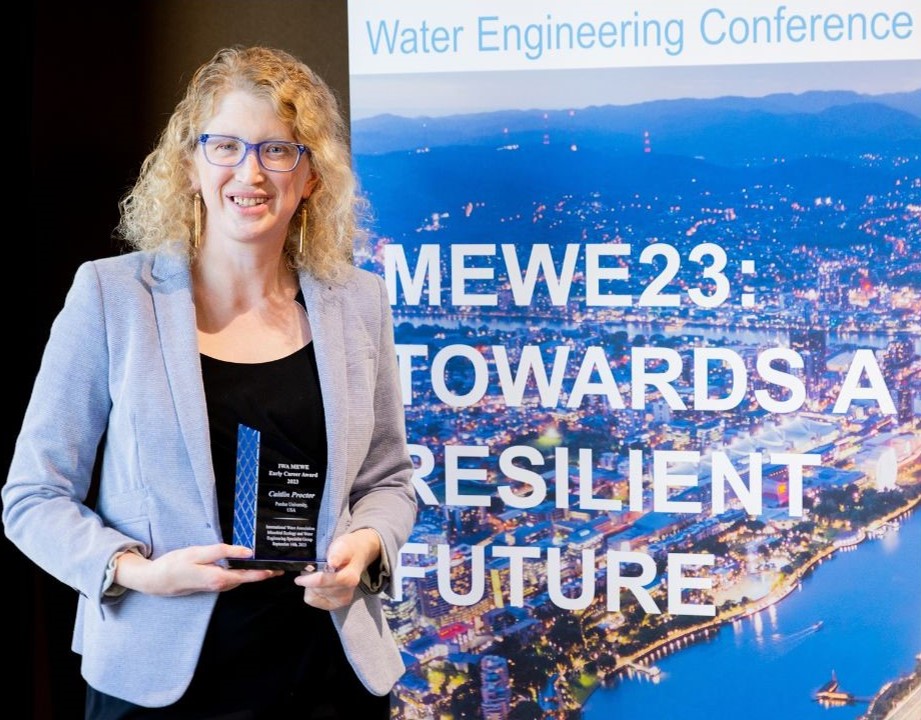Caitlin Proctor & Water
Her journey, personality, and work in Environmental and Ecological Engineering (EEE), and Agricultural and Biological Engineering contain reflections of waters most essential qualities. Like the water she studies, Professor Proctor is grounded, connective, and seeks to care for the environment around her.

Getting Grounded
Proctor arrived at Purdue as a post doc straight out of Switzerland where she worked at EAWAG, the Swiss Federal Institute of Aquatic Science and Technology. While researching there, she simultaneously earned a PhD through ETH Zurich. Though she didn’t initially plan on pursuing a doctorate degree, Proctor found the experience exciting and enlightening.
“It was exciting because I could devote most of my time to research, instead of classes. I started to sincerely enjoy research and problem-solving after being able to dive into it full-time,” Proctor says.
The enlightening part came in an unexpected way. According to the Environmental Performance Index (EPI), Switzerland is ranked number one in best water quality in the world.
“Living in Switzerland and having my work be in drinking water, was amazing. I would go hiking and find flowing taps that I could drink directly out of. There was piped water everywhere that was safe to drink without treatment. So, as I was working with drinking water in my research, it was inspiring to be in a place that valued drinking water so much and to see what was possible,” Proctor shares.
After her post-doctoral work at Purdue in 2020, Proctor joined the faculty of EEE and Agricultural and Biological Engineering where she has led and contributed to many projects and experiments.
Adhesion and Cohesion
Professor Proctor excels in building connections—whether it’s fostering multidisciplinary collaborations, working with communities to address water quality issues, or engaging faculty across campus in social events. The relationship between people and the environment is one of the reasons Proctor felt drawn to EEE.
“I really loved environmental engineering just because there was this relationship to people included. It was engineering that contributed directly to safety and public health,” Proctor shares.
Proctor not only prioritizes connecting in research application, but socially as well. As co-chair of the Purdue Faculty Association, she spends much of her time and energy outside of work bringing faculty across campus together in a social setting.
She is also involved with various environmental and water organizations including the International Water Association. In 2023, she earned the Early Career Research Award in Microbial Ecology and Water Engineering from the International Water Association.

Caitlin Proctor accepts the 2023 the Early Career Research Award in Microbial Ecology and Water Engineering from the International Water Association. On receiving the award, Caitlin says, “I've been particularly involved in this society and group because it incorporates many different aspects of my research. I was excited to receive this award and am equally excited to stay involved in their work.”
Nurturing Nature
Professor Proctor’s research is dedicated to safeguarding and improving water quality with the goal of caring for environments and communities. She specializes in environmental engineering, civil engineering, and drinking water, but she also devoted much of her PhD to molecular microbiology.
Proctor is part of a project that recently received funding from the National Science Foundation (NSF). The project aims to develop a process to effectively recover critical materials from landfills. Proctor’s contribution to includes exploring the use of microbes in leachate, the water that moves through a landfill, to aid in collecting these materials which will be filtered out and recycled.
Unfortunately, living things aren’t the easiest to handle. They often don’t cooperate, but Proctor is up for the challenge.
“There's so much potential in microbes to do things more sustainably. We could use less energy, put less out into the environment, and use fewer chemicals. Microbes can produce their own energy while working for us. There's just so much potential there that I'm excited to explore,” Proctor says.
Conclusion
Caitlin Proctor might be the same percentage of water as the average human, but her connection to it goes deeper. Professor Proctor is advancing our understanding of water systems, inspiring environmental stewardship, and building connections along the way. Her work ensures that this vital resource continues to support and enrich our world.

In addition to being a respected civil engineer, an award-winning water researcher, and one of Purdue Environmental and Ecological Engineering’s expert faculty, Proctor is an avid hiker, dog lover (see her dog Digby above), and self-proclaimed “swiftie.”
